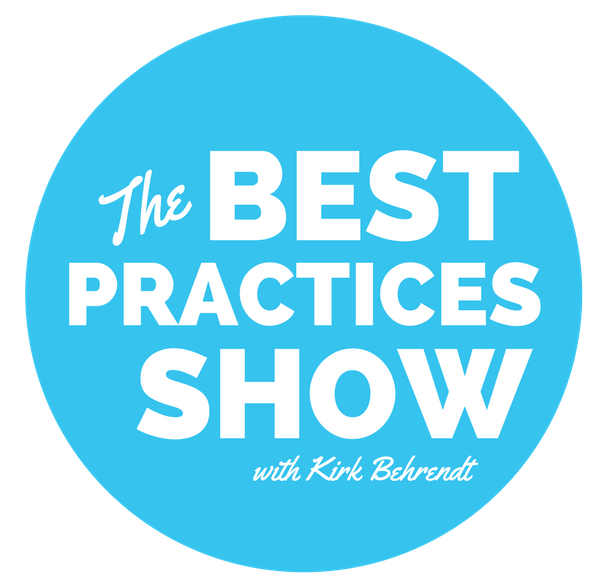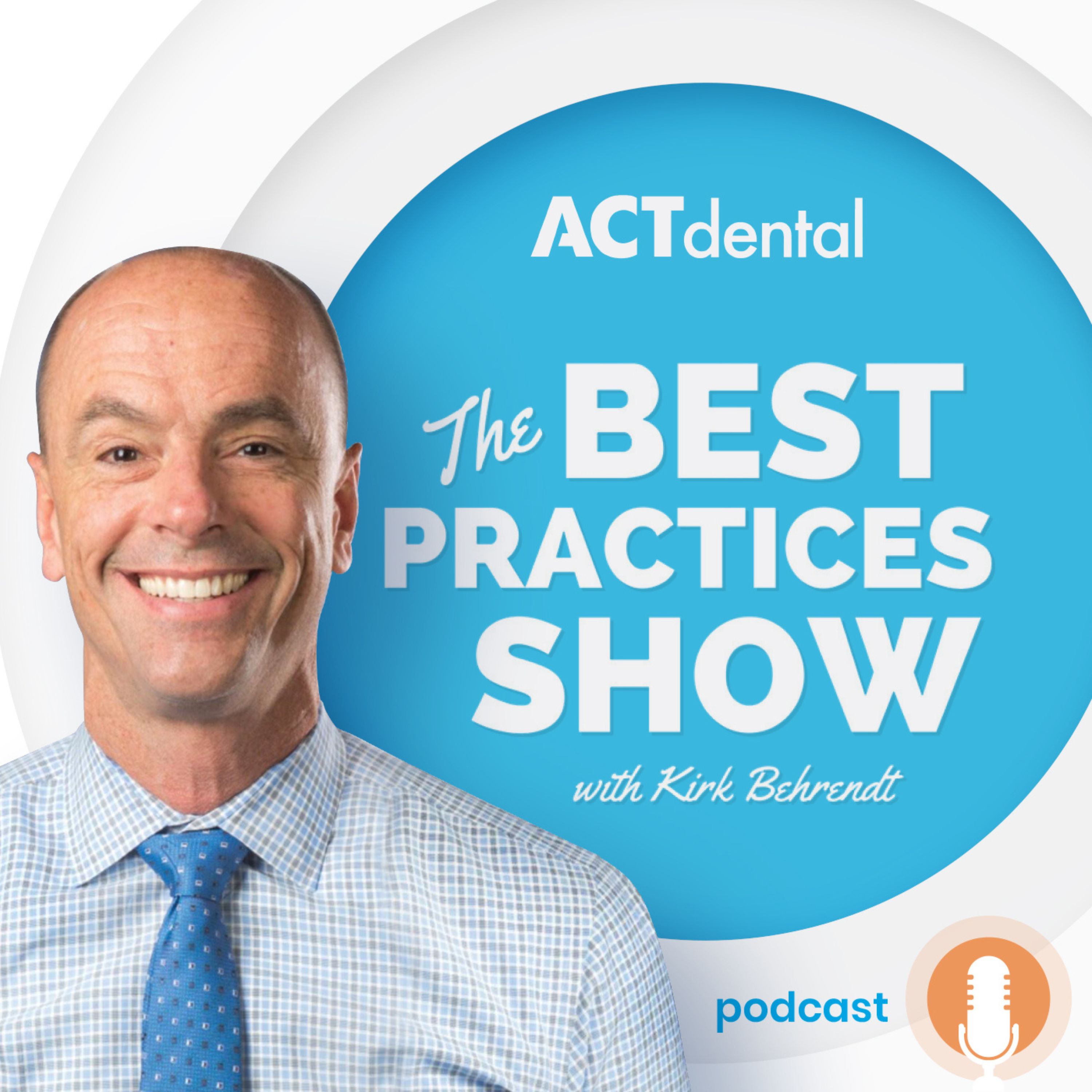Episode 530
530: An Answer to the Great Resignation - Dr. Steven Kupferman
530: An Answer to the Great Resignation - Dr. Steven Kupferman
If you're tired of experiencing the Great Resignation, there is a solution — you just need to be open to it. To tell you about virtual assistants and how it changed his practice, Kirk Behrendt brings in Dr. Steven Kupferman, co-founder and CEO of MedVA, a company that provides qualified virtual assistants specifically for doctors. Is your in-house staff overwhelmed? Are things not getting done? A virtual assistant can help! To learn more about MedVA and how they can support your practice, listen to Episode 530 of The Best Practices Show!
Episode Resources:
- Dr. Kupferman’s website: https://la-coms.com
- Dr. Kupferman’s email: drkupferman@medva.com
- MedVA: https://medva.com
- Subscribe to the Best Practices Show Podcast
- Join ACT’s To The Top Study Club
- Join ACT’s Master Class
- See our Live Events Schedule here
- Get the Best Practices Magazine for Free!
- Write a Review on iTunes
Links Mentioned in This Episode:
The White Coat Investor: https://www.whitecoatinvestor.com
Kolbe: https://www.kolbe.com
Main Takeaways:
Virtual assistants can do almost anything your in-person employees do.
Your front desk person may benefit from having a virtual assistant.
Figure out which tasks you can outsource to virtual assistants.
Having virtual assistants will improve in-house staff retention.
There is no language barrier hiring MedVA assistants.
Quotes:
“You go back and forth in your mind, ‘Can I do this? Can I not do this? Are they going to be able to do this? Are they not going to be able to do this? How are they going to help me? Is it worth the money? Security — I'm not going to meet them. Who are they?’ But sometimes, you've got to take a leap of faith and try something out. You won't know whether it’s effective or not until you actually try it. And that's what happened with me. I had this incredible first virtual assistant, who still works for me to this day, who was so dedicated. He, to this day, is one of the best employees I've ever had.” (5:36—6:18)
“The great thing about a virtual assistant is everything is recorded. You can record your training sessions with them, and then that institutional memory gets passed on very easily. So, once I started to get things under control, the easiest things to give them were things like getting benefits and revenue cycle stuff. That has become, in my mind, something that should not be done by taking up real estate in your office. That's a job that should be done remotely from start to finish. That was really where things got started, and that's the easiest way to really get into the virtual assistant space, is to have them do revenue cycle, benefits verification, and things like that.” (7:46—8:33)
“[Insurance companies] are often hampered by the Great Resignation, more so than the dental offices. And so, they don't have people to answer phones. Most of their work is also done offshore. Sometimes, you can wait 15 minutes just to get somebody on Delta Dental or somebody on some other payer. So, 15 minutes is a good day, I think, for benefits verification — unless you're using some sort of online portal, which, oftentimes, you don't really trust anyway, or more offices don't trust, especially if you're doing a big case of some sort. So, 15 minutes is par, I think, for benefits verification. And it could be longer. That's what we’ve seen. And so, that's what we’ve done. We've utilized our offshore team to do that exclusively, and that's been fantastic.” (8:58—9:54)
“I went from there to accounting, bookkeeping, marketing, HR, scribing, letters, notes, and reports. And the tasks are endless. I mean, obviously, they can't be a dental assistant. They can't be a medical assistant. They can't take blood pressures and vital signs, and suction for you, and choose the shade of composite that you're going to be using that day. But everything else that's running in the practice can almost all be done virtually.” (11:25—12:04)
“The people that are running your practice, they don't like to do mundane tasks. That's what burns them out. And so, what you end up doing when you're utilizing virtual staff, you can really promote the people that are there, move them to higher-level tasks, do more to retain them, pay more to retain them, while putting these other tasks of, for example, sitting on the phone waiting for Delta Dental to answer, have somebody else doing that so that they can greet patients, which I think a lot of people who are in your office love to do. They love the patient interaction, even though they're not caring for the patient, or suctioning, or making a temporary crown. They love the patient interaction, the administrative staff. You want to keep them as long as possible, retain them, and using virtual assistants allows you to do that.” (12:53—13:47)
“The first language in the Philippines is English. They have Tagalog, which is their language. But everybody learns English from day one in school, so that is the official language of the Philippines. So, language is not a barrier. Now, they use different words for different things, just like they do in the UK, for example, or in Australia. But language is not a barrier at all.” (14:10—14:34)
“[The Philippines is] a healthcare-oriented country. They care for people. That's what Filipinos are known to do. In many other countries, they employ people from the Philippines to care for people. So, they are healthcare-centered. Everything there is healthcare centered. And so, the virtual assistants that I have are generally in the healthcare field to begin with, before we even do any training for them on U.S. healthcare. They're healthcare-trained at the outset, whether they're nurses, or therapists, or physical therapists, or whatever it may be, dental assistants or dentists. They're already healthcare-trained professionals. That's what they do in that country. Those are their main industries.” (14:45—15:30)
“All the other marketing stuff, making brochures and taking out ads, or whatever else you're doing for marketing, can be done remotely, of course. Visiting offices is harder. Bringing cookies or asking offices is a little harder. But if you think out of the box a little bit and you get a DoorDash account, and you call, or you use companies — there are companies that will deliver lunch to businesses. Forget medical or dental businesses. Deliver lunch and have a virtual lunch meeting. There are companies that do that on a day-to-day basis now. And they’ve taken off during the pandemic because it’s much easier to have a company send lunch to 10 people and then meet on Zoom, especially in high-traffic areas like California, New York, Chicago, and all those other places. So, marketing is easy if you think out of the box a little bit.” (18:13—19:10)
“[This concept of virtual assistants is] really new, and I think a lot of people, generally, are hesitant to try something new. Most dentists have a smaller operation and they don't need it — they don't feel that they need it because they’ve got one person working up front, and maybe one in the back, or two in the back, or three in the back, and they don't know that the person up front is overwhelmed and holding things together on their own, and that they could use a little help and add $10 an hour, $15 an hour, whatever it is. They can use that help. So, I think that that's probably where people get it wrong, is you think everybody is doing fine until they leave, and they say, ‘Gosh, I'm working too hard,’ or, ‘I'm resigning.’ I think that that's where a lot of people get it wrong, thinking that it’s not for them, or that, ‘I can't do this.’” (21:14—22:16)
“The simplest things like hygiene recall and getting patients in that have treatment plans that are not completed that the person upfront doesn't have time to do, and all these little tasks that you have on your mind, your email and your inbox, pass them off. [Virtual assistants will] get it done.” (25:09—25:28)
“I've always struggled with the transmission of institutional information along the way. I started with one employee in 2009. And the things that I discussed with the employee are gone, the goals that I had. The information that had gone from employee to employee is a game of telephone, and it doesn't always translate. But if you're having your first session with a virtual assistant, that's all recorded. You can record it all, and you can tell them everything. And then they’ll remember it, they’ll watch it, they’ll share it with the next virtual assistant. And all that becomes much more scalable rather than handing them an employee manual or whatever book you have, your standard operating procedure book or whatever it happens to be in your practice.” (26:07—26:59)
“I think that the real innovation is that these are people who are really working for you. You're not as much outsourcing them as you are hiring people who are working remotely. They happen to be in the Philippines, but they're going to be people who are working specifically for you. I think outsourcing where you sign up with an agency and they're answering your calls, or you're faxing them or emailing information to work on, and they're working on stuff for you and stuff for somebody else, to me, that's not an ideal situation. I think the real ideal situation is to find a company that is going to provide people that are working specifically for you. They are your employees. You tell them what your hours are, what you want them doing for you, specifically, and they're working specifically for you. And you take care of them like any other employee.” (30:11—31:01)
Snippets:
0:00 Introduction.
1:37 Dr. Kupferman’s background.
3:19 Why he started MedVA.
5:21 Resistance to having virtual assistants.
6:53 Training virtual assistants.
8:34 The best place to start utilizing virtual assistants.
9:59 How MedVA grew and evolved.
12:11 Things he learned from outsourcing.
13:49 Is there a language barrier with virtual assistants?
15:30 Scalability and marketing.
19:11 Ways to manage virtual assistants.
20:59 What people get wrong about virtual assistants.
22:16 Virtual assistants help get things done.
23:22 How it works and where to start.
25:29 Scalability in training virtual assistants.
28:26 More about MedVA.
29:59 Last thoughts.
Dr. Steven Kupferman Bio:
Dr. Steven Kupferman, Co-Founder and Chief Executive Officer of MedVA, holds M.D. and D.M.D. degrees from the David Geffen School of Medicine at UCLA and from Harvard School of Dental Medicine, respectively. He brings nearly two decades of experience in the healthcare industry. He is the founding physician of LACOMS, Los Angeles’s premier Oral and Maxillofacial Surgery Center, where he first pioneered the use of Virtual Assistants to optimize the management of his practice while simultaneously improving the quality of patient care. Dr. Kupferman and his wife, Danielle, reside in Los Angeles with their four children.


